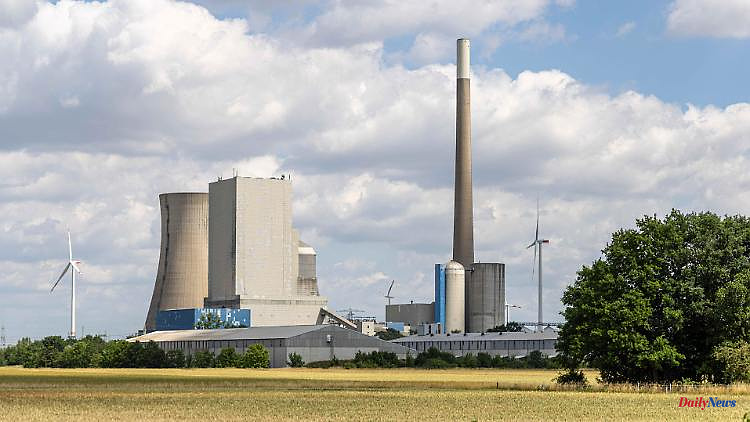In order to stabilize the power supply in Europe, a first reserve power plant is put back into operation. Other operators are determined to bring their systems back on line as well. One of the reasons is the massive loss of capacity in France.
To combat the impending gas shortage, a first reserve coal-fired power plant is returning to the electricity market. It is the Mehrum power plant in Hohenhameln, Lower Saxony (Peine district) between Hanover and Braunschweig, which belongs to the Czech energy group EPH. So far, it is the only "market return" of a power plant that has been reported to the Federal Network Agency, the authority said. Since July 14, an ordinance has allowed hard coal-fired power plants from the so-called grid reserve to be put back into operation in order to save natural gas.
The power plant has been back online since Sunday afternoon, said the managing director of the operating company, Armin Fieber. The system will now be in operation for at least 14 days to stabilize the grid. It is currently still unclear whether the power plant has returned to the electricity market in a formal sense. According to the operator, the Mehrum power plant has been in reserve since the beginning of December 2021. It has a net capacity of 690 megawatts.
A controversy arose within the federal government over the weekend about generating electricity from gas. Finance Minister Christian Lindner called for this to be stopped. A spokesman for Economics Minister Robert Habecks pointed out that a complete abandonment of gas in the electricity sector would lead to the electricity crisis and blackouts.
According to the Fraunhofer Institute for Solar Energy Systems (ISE), natural gas accounted for 9.8 percent of net public electricity generation in Germany in July. According to the ISE electricity expert Bruno Burger, these include gas-fired power plants with heat extraction, which also supply district heating networks in addition to electricity generation. On the other hand, there are also gas-fired power plants that are currently selling their electricity on the stock exchange, mainly because of the electricity shortage in France. Burger said that in July there was less nuclear power produced there than in any other month since at least 2015 due to numerous blocks that were currently taken off the grid.
In the European electricity market, France is normally an electricity exporter. These quantities were now also missing in other countries such as Italy or Switzerland. In addition to the high gas prices, this additional demand is also a reason for the increased wholesale prices. According to him, around half of the electricity generated in Germany is traded on the electricity exchange, the other half via direct contracts between electricity producers and consumers.
The federal government's ordinance allows electricity to be sold from reserve power plants that are fired with hard coal or oil until the end of April 2023. Starting up again for several months is economically interesting for power plant operators because wholesale electricity prices are currently high. At the same time, there is sufficient hard coal on the world market. The measure is intended to force natural gas out of the electricity market.
The Essen-based energy company Steag also wants to sell more electricity again. Company spokesman Markus Hennes said they have "firm intentions" to return to the market with 2,300 megawatts of generation capacity. The power plants are in Saarland and North Rhine-Westphalia. Steag still sees hurdles in the financial security of the coal reserves, which must be available according to the Replacement Power Plant Availability Act (EKBG), and in transport logistics.
The Düsseldorf-based energy company Uniper is also examining the return of its reserve systems with a total output of more than 2000 megawatts to the market. But no decision has been made yet, said spokesman Oliver Roeder.
The Karlsruhe energy group EnBW does not want to bring its five reserve power plants back onto the market because they can no longer run continuously for reasons of age. Regardless of the special regulations, the company wants to keep a coal block in Karlsruhe running at least until the end of winter 2023/24. EnBW originally wanted to register this unit for decommissioning in the summer of 2022 as part of the phase-out of coal.
In addition to the already valid ordinance for hard coal and oil power plants, an ordinance for restarting brown coal power plants that have already been shut down is also being prepared for the beginning of October. In addition, there is a gas saving regulation that is intended to prevent the unnecessary generation of electricity from natural gas.












